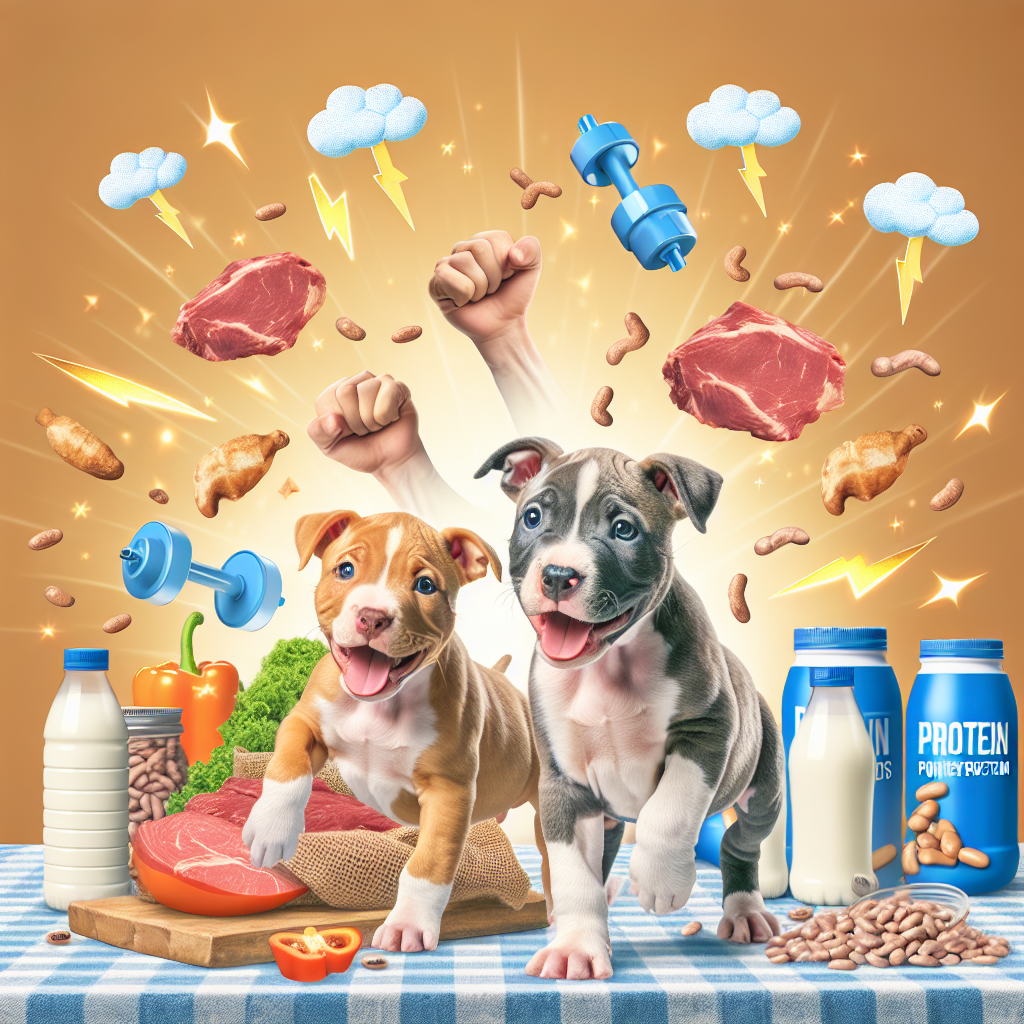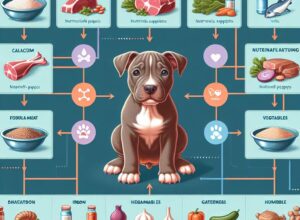
Key Takeaways
-
Protein is essential for pitbull puppy growth, muscle development, and overall health.
-
High-quality animal proteins like chicken, beef, and fish are ideal for pitbull puppies.
-
Proper protein intake should be calculated based on the puppy’s weight and activity level.
-
Look for puppy foods that meet AAFCO standards to ensure balanced nutrition.
-
Transition to new protein sources gradually to prevent digestive upset
Pitbull Puppies: Protein Power-Up
When you’ve got a pitbull puppy, you’re not just a pet owner; you’re the guardian of a growing powerhouse. These pups pack more than just energy; they carry the potential to become strong, healthy adults. And just like a building needs the right materials to stand tall, your pitbull puppy needs the right nutrition to grow up right. Let’s dive into why protein is so crucial for your furry friend and how to make sure they’re getting enough of it.
Why Protein Is Key for Growing Pitbulls
Think of protein as the building blocks for your puppy’s muscles. It’s not just about bulking up; protein is vital for their overall development. It helps repair body tissues, makes enzymes and hormones, and is essential for growth and bone health. For a pitbull puppy, whose breed is known for its muscular build and high energy levels, getting enough protein is non-negotiable.
Understanding Your Puppy’s Dietary Needs
Every pitbull puppy is unique, and so are their dietary needs. But there’s a general rule of thumb to follow: a growing pitbull puppy needs more protein than an adult dog. They’re building their body’s foundation, and they need the right tools for the job. That’s where you come in, making sure their diet supports their rapid growth and sets them up for a healthy life.
Now, let’s get to the heart of the matter. You’re here because you want the best for your pitbull puppy, and that means feeding them the best protein sources out there. But before we get into the specifics, remember this: balance is key. While protein is important, your puppy also needs a mix of fats, carbohydrates, vitamins, and minerals to thrive. So, let’s make sure their plate is as well-rounded as they are.
Calculating the Right Protein Intake
So, how much protein does your pitbull puppy actually need? While there’s no one-size-fits-all answer, a good guideline is that puppies require about 22% protein in their diet. But, keep in mind, this isn’t just any protein; it has to be high-quality and easily digestible. To calculate the right amount, you’ll want to consider your puppy’s weight and expected adult size, which can vary even within the breed. Typically, a pitbull puppy might need anywhere from 1 to 2.5 cups of puppy food, divided into several meals, but always check the specific recommendations on your puppy food packaging and consult with your vet.
Recognizing the Signs of Protein Deficiency and Excess
Now, let’s talk about balance. Too little protein, and your puppy could end up with stunted growth, lack of energy, and a weak immune system. On the flip side, too much protein can lead to weight gain and stress on their kidneys. Signs of protein deficiency include a dull coat, skin problems, and lethargy, while excess protein might manifest as hyperactivity or aggression. Monitoring your puppy’s behavior and physical condition is key to ensuring they’re getting just the right amount of protein.
Incorporating Protein into Your Pitbull Puppy’s Diet
Feeding your pitbull puppy the right amount of protein isn’t just about measuring cups of kibble. It’s about creating a diet that’s both nutritious and exciting for your pup. You’ll want to offer a variety of protein sources, including both animal and plant-based options, to provide a full spectrum of amino acids. This also helps to keep mealtime interesting for your puppy, encouraging a healthy appetite and zest for their food.
Timing and Frequency of Meals
When it comes to feeding schedules, consistency is your best friend. Puppies do best with small, frequent meals. Aim for three to four meals a day, evenly spaced out, to keep their energy levels stable and support their metabolism. As they grow, you’ll gradually decrease the frequency of meals, transitioning to two meals a day by the time they reach adulthood.
Recipe Ideas: Making Protein Fun and Tasty
Let’s get creative with protein! Here are some puppy-approved ideas to make those nutrients irresistible:
-
Chicken and Rice Delight: Cooked, boneless chicken with brown rice and a sprinkle of peas.
-
Beefy Pumpkin Mash: Ground beef with pureed pumpkin for a fiber-rich twist.
-
Fishy Feast: Flaked, cooked salmon with a side of sweet potato.
Remember to introduce new recipes gradually to avoid upsetting your puppy’s stomach.
Transitioning Foods: Ensuring a Smooth Change in Protein Sources
Change can be hard, especially on a puppy’s digestive system. When introducing a new protein source, do it slowly over the course of a week. Start by mixing a small amount of the new food with the old, gradually increasing the proportion of the new food each day. This helps your puppy’s gut adjust and can prevent any digestive issues.
Selecting the Right Protein-Enriched Puppy Food
Choosing the right food for your pitbull puppy can be a daunting task, but here’s a simple checklist to help you make the best choice:
-
Look for foods that specify “Complete and Balanced” on the label.
-
Ensure the first ingredient listed is a high-quality animal protein source.
-
Check for the AAFCO statement that confirms the food meets nutritional standards for puppies.
What to Look for on the Label
When scanning the label, your eyes should dart straight to the ingredients list. Top-quality puppy foods will list a whole protein source as the first ingredient—think chicken, beef, or fish. You’ll also want to see a blend of fruits and vegetables for vitamins and minerals, as well as healthy fats like fish oil for brain development and a shiny coat.
Most importantly, avoid foods with vague terms like “meat by-products” or “animal digest.” These can be a sign of low-quality protein that won’t give your pitbull puppy the nutrition they need to thrive.
Avoiding Common Fillers and Additives
Besides that, keep an eye out for fillers and additives. Corn, wheat, and soy often serve as cheap protein sources but are less nutritionally valuable and can cause allergies. Artificial colors, flavors, and preservatives are also red flags—they’re unnecessary and can be harmful to your puppy’s health.
Recommended Protein-Rich Foods for Pitbull Puppies
Now, for some protein-packed food recommendations for your pitbull puppy. Here are a few options that check all the boxes:
-
Blue Buffalo Wilderness Puppy Chicken Recipe: High in protein and grain-free, with DHA for brain development.
-
Taste of the Wild High Prairie Puppy Formula: A blend of bison and venison, this food is rich in protein and other nutrients for optimal growth.
-
Wellness CORE Natural Grain-Free Puppy Food: With turkey and chicken, this food provides a balanced diet with a focus on protein.
Feeding your pitbull puppy the best protein is about more than just filling their bowl; it’s about setting them up for a lifetime of health and happiness. With the right knowledge and a little bit of love, you’ll have a loyal, strong companion by your side for years to come.
Can I give my pitbull puppy adult dog food for higher protein?
It might be tempting to switch to adult dog food to up the protein for your pitbull puppy, but it’s not a good idea. Adult dog food isn’t formulated for the growth stage puppies are in. They need specific nutrients in different amounts than adult dogs. Adult food can have higher protein, but it’s not balanced for a pup’s development and can lead to growth issues and nutrient imbalances.
Remember, puppies have different nutritional needs than adult dogs. Their bodies are growing rapidly and require a delicate balance of nutrients, including calcium and phosphorus, in addition to protein. Feeding adult dog food to a puppy can result in too much or too little of these crucial elements, potentially leading to bone and joint problems. Stick to puppy-specific formulas—they’re crafted to support your growing pitbull’s health.
-
Choose puppy-specific formulas for balanced growth.
-
Avoid adult dog food to prevent nutrient imbalances.
-
Consult with your vet to ensure your puppy’s diet meets their needs.
If you’re ever in doubt about what to feed your pitbull puppy or how much protein they need, your vet is the best resource. They can provide guidance tailored to your puppy’s specific health profile and growth trajectory.
How can I tell if the protein in my puppy’s food is high quality?
High-quality protein in puppy food is typically sourced from real meat like chicken, beef, or fish. It’s digestible and provides the amino acids your pitbull puppy needs to grow strong. Here’s how you can ensure the protein in your puppy’s food is top-notch:
-
Check the ingredients list—real meat should be the first item.
-
Look for whole meat sources, not meat by-products or meal.
-
Research the brand’s reputation for quality and recall history.
When you see a named meat source as the first ingredient, like ‘chicken’ or ‘beef’, it’s a good sign. But if the list starts with ambiguous terms like ‘meat meal’ or ‘animal by-product’, the quality might be lower, and it could be harder for your puppy to digest.
Furthermore, the brand’s reputation can tell you a lot. Companies that have a strong commitment to quality often have fewer recalls and are more transparent about their sourcing and manufacturing processes. Do your homework—it pays off for your pup’s health.
Are there any risks to feeding my pitbull puppy a high-protein diet?
While protein is essential, too much of it can strain your pitbull puppy’s kidneys and liver as they work to process the excess. A high-protein diet can also lead to weight gain if it’s not balanced with the right amount of exercise. Always aim for a diet that’s appropriate for their age and activity level.
Moreover, a diet excessively high in protein can potentially exacerbate certain health conditions and may not provide a balanced intake of other necessary nutrients like fats and carbohydrates. Balance is the goal. The best approach is a diet formulated specifically for puppies, which ensures they get the right amount of protein along with other vital nutrients.
What do I do if my pitbull puppy doesn’t seem to like protein-heavy food?
If your pitbull puppy turns their nose up at protein-rich food, don’t worry—there are ways to make it more appealing. You can try moistening dry food with a bit of warm water or puppy-safe broth to enhance the smell and taste. Mixing in a small amount of wet food can also make meals more enticing.
Keep in mind that puppies can be picky eaters, and their preferences can change. Be patient and offer a variety of protein sources. If your puppy consistently refuses their food, consult with your vet to rule out any potential health issues and discuss alternative feeding strategies.
Is raw protein better for pitbull puppies than cooked protein?
The debate between raw and cooked protein for puppies is ongoing. Some argue that raw diets offer more natural nutrition, similar to what dogs would eat in the wild. However, raw diets come with risks such as potential exposure to pathogens like Salmonella and E. coli. Cooked protein is safer, as the cooking process kills harmful bacteria.
Additionally, cooked protein is often more digestible for puppies, allowing them to absorb nutrients more effectively. If you’re considering a raw diet, it’s crucial to do thorough research and consult with your vet to ensure it’s properly balanced and safe for your pitbull puppy.
In the end, the best protein for your pitbull puppy is the one that meets their nutritional needs, is safe, and is something they’ll eat happily. Whether you choose raw or cooked, make sure it’s part of a balanced diet designed for a growing puppy. And always keep food safety in mind, handling and storing your puppy’s food properly to prevent any health issues.
Feeding your pitbull puppy a diet rich in high-quality protein is one of the most important things you can do for their health. By following these guidelines, you can help ensure your puppy grows up strong, healthy, and full of life. Remember, when in doubt, your vet is there to help guide you on the path to a well-nourished, happy puppy.



